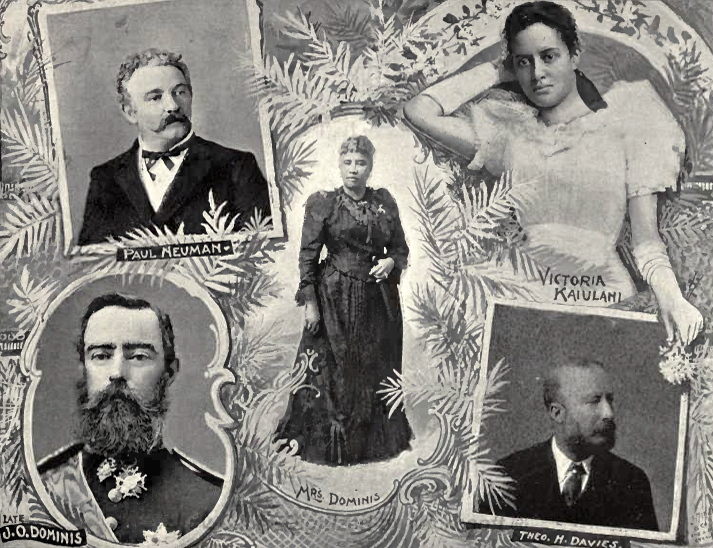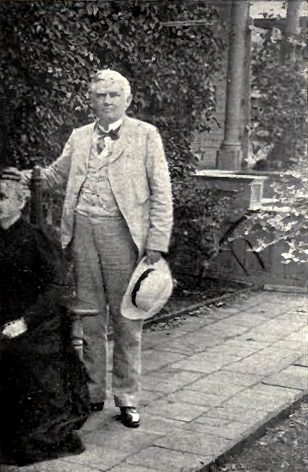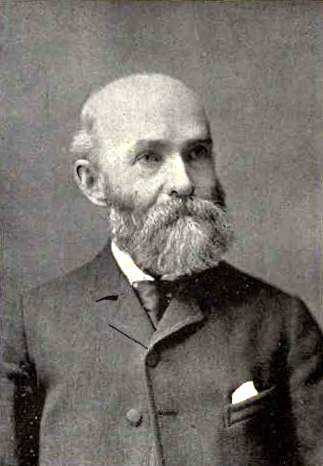History of Later Years
of the Hawaiian
Monarchy
PART 2, CHAPTER 4
|
Negotiations at Washington The five Commissioners of the Provisional Government arrived at Washington, February 3rd, and were well received by the administration. The favor with which their mission was received by the press and people of the United States surpassed all expectation, and the impression then made has never been effaced. The Chamber of Commerce of San Francisco and the Legislatures of several states passed resolutions in favor of annexation. They had official interviews with the Secretary of State on the 4th, 7th and 9th of February, and were introduced to President Harrison on the 11th. Hon. C. R. Bishop and W. A. Kinney joined them at Washington, and gave them valuable assistance, both by their influence and their counsel. President Harrison and his Cabinet devoted much time and study to the subject of the proposed treaty of annexation, giving it precedence over other business for the time. On the 7th, Secretary Foster informed the Commissioners that the Cabinet had decided to proceed immediately with the negotiation of the treaty of annexation, which they had reason to believe would be ratified by the necessary two thirds vote of the Senate. The financial provisions necessary for carrying out the treaty might be left to be acted upon by the House of Representatives at a later period. Accordingly the treaty was drawn up by the Secretary and the Hawaiian Commissioners, and signed on the 14th of February. In drafting this treaty it was sought to accomplish its main object without infringing on the legislative prerogatives of Congress, to avoid arousing unnecessary opposition in that branch of the government. Hence it reserved to Congress the determination of all questions relating to the future form of government of the annexed territory, the manner and terms under which the revenue and navigation laws of the United States were to be extended to it, etc., but provided that until Congress should legislate on these subjects, the existing government and laws of the Hawaiian Islands should be continued in force. On this point President Harrison expressed himself as follows: "This legislation should be, and, I doubt not, will be not only just to the natives and all other residents of the islands, but should be characterized by great liberality and, a high regard to the rights of the people and of all foreigners domiciled there." The treaty made a liberal provision for the deposed Queen Liliuokalani, and the Princess Kaiulani. It was laid before the Senate for its concurrence on the 17th of February, and was in the following terms:
The Treaty was favorably reported upon by the Committee on Foreign Relations, of which Senator Morgan is the chairman, and was favored by a large majority of the Senate. It was, however, so near the close of the Congressional term that it was impossible to press the matter to a vote, or even to gain time for a discussion of it in the executive session. It had to be left as a legacy to the next administration. Nor was it long before certain adverse influences began to manifest their presence in Congress.
The ex-Queen had sent a letter to President Harrison on the 19th of January, by the Claudine, requesting that no steps should be taken by the Government of the United States until her side of the case had been heard. On the 2nd of February, she dispatched two commissioners by the Australia, to represent her cause at Washington, viz., Mr. Paul Neumann and the young prince David Kawananakoa. They were accompanied to Washington and back to Honolulu by Mr. E. C. Macfarlane, one of the ablest of her adherents. Paul Neumann carried with him not only a commission as envoy extraordinary and minister plenipotentiary, but also a power of attorney, authorizing him in the first place, to negotiate with the United States Government for "such official or other consideration, benefit or advantage" as could be obtained from the United States for herself and Kaiulani; and secondly; if "no official consideration" for herself or Kaiulani should be attainable, then to arrange for "such pecuniary considerations, benefits and advantages," as could be secured for herself and Kaiulani from the United States, and to execute in her name whatever releases and acquittances of all her "claims to the throne of the Hawaiian Islands" might be requisite to secure such pecuniary consideration. Mr. Neumann also took with him a letter signed by the ex-Queen on the 31st of January, addressed to the President elect, Hon. Grover Cleveland, in which she asked for his "friendly assistance in granting redress for a wrong which we claim has been done to us, under color of the assistance of the naval forces of the United States in a friendly port." As her attorney, he had skillfully drawn up a precis or statement of the circumstances attending the revolution, to support this contention that the Queen's surrender had been compelled by the forces of the U. S. ship Boston. In this document he made the following statement in regard to the events succeeding the revolution:
The ex-Queen's commissioners left San Francisco, February 11th, reaching Washington on the 17th. Mr. Macfarlane and Prince David at once proceeded to New York to present her autograph letter, together with a copy of Mr. Neumann's precis to the President elect. On their arrival there they had an interview with Mr. O'Brien, his private secretary, through whom they sent the documents to Mr. Cleveland at Lakewood. He immediately caused the precis to be published in the New York World. It is evident that his mind was deeply impressed at the outset with the belief that the late revolution was the result of a deeply-laid conspiracy, aided and abetted by the United States Minister and Capt. Wiltse of the Boston. The influence of the President-elect soon began to be felt in the attitude of the Democratic Senators towards the treaty. Hostility to it also began to be expressed by Democrats in the House of Representatives. Mr. Neumann had an interview on the 21st with Secretary Foster, to whom he presented a copy of his statement and also sent another copy to the Senate Committee on Foreign Relations.
Meanwhile another party appeared upon the scene. The Princess Kaiulani, daughter of Gov. Archibald Cleghorn of Honolulu, and the Princess Likelike, the younger sister of Liliuokalani, was heiress presumptive to the throne of Hawaii. She was seventeen years of age and had been residing for some years in England for her education, under the guardianship of Theophilus H. Davies, Esq., a gentleman who had amassed a large fortune in mercantile pursuits in Honolulu. On hearing of the deposition of the Queen, Mr. Davies at once took active steps in the interest of his royal ward. While fully admitting the justice of the Queen's deposition, he protested against annexation, and proposed a Regency in the name of Kaiulani, with Mr. Dole at its head, to administer the Government for three years, after which Kaiulani should be installed as Queen. Mr. Davies embarked with the youthful princess from Liverpool, February 22d, arriving at New York, March 1st. They immediately issued the following poetical manifesto:
This proceeding' on the part of Mr. Davies was entered upon without consulting Liliuokalani, and was deprecated by her envoys, who feared that it would prejudice their cause with the American people. Mr. Davies and his ward arrived at Washington, March 8th, where he was accorded a friendly hearing by the President, which inspired him with hope and confidence. The Princess was cordially received at the White House on the 13th, and seems to have won the heart of her gracious hostess. She published her farewell address to the people of the United States, March 21st, and sailed the same day for Liverpool.
The President was inaugurated on Saturday, March 4, 1893. On Monday, the 6th, the Senate met in special session to confirm the appointment of his Cabinet. On Thursday, the 9th, the Senate held its next session, when the President sent in a message, withdrawing from their consideration the treaty negotiated with Hawaii. This he did without assigning any reasons or stating his intentions. The new Secretary of State, Mr. Gresham, told Commissioner Thurston on the 10th, that "with insignificant knowledge of facts and of detail, they desired time for consideration of .the subject, and the treaty had been withdrawn for that purpose." On the same day he intimated to Admiral Brown his impression that "some kind of a job was mixed up in the matter." On the same day Secretary Hoke Smith telegraphed to Mr. Blount of Macon, Georgia, asking him to "come prepared for a confidential trip of great importance" to Honolulu. From that day on the President became inaccessible to the Hawaiian Commissioners, and from that time on they could obtain no information as to the intentions of the Administration concerning Hawaii.
Messrs. Wilder and Marsden of the Hawaiian Commission speedily returned home. Mr. Castle followed later, arriving in Honolulu, April 7th, in company with the ex-Queen's commissioners and Mr. Nordhoff. Mr. C. L. Carter remained at Washington during Mr. Thurston's absence at Chicago; but the Secretary constantly declined to allow him any opportunity of making a statement on behalf of the Provisional Government. J. Mott Smith was superseded as Hawaiian Minister at Washington by Mr. L. A. Thurston, who was officially received as Minister by President Cleveland, June 9, 1895. The President in replying to Thurston's address, said in part: "I beg to assure you that our people and Government are at all times willing and anxious to strengthen and multiply the ties of friendship which bind us to the people of Hawaii. To this end no effort on our part shall be neglected which is consistent with our traditional national policy, and which is not violative of that devotion to popular rights which underlies every American conception of free government." |
||
|
|
|
|
|
|
|
|
||
| History | Atlas | Culture | Language | Links |


